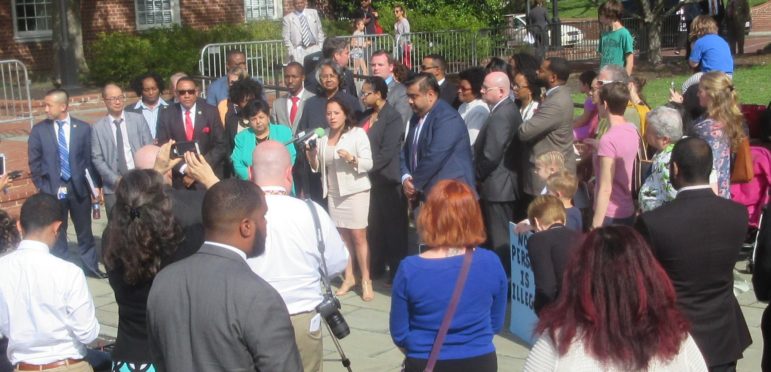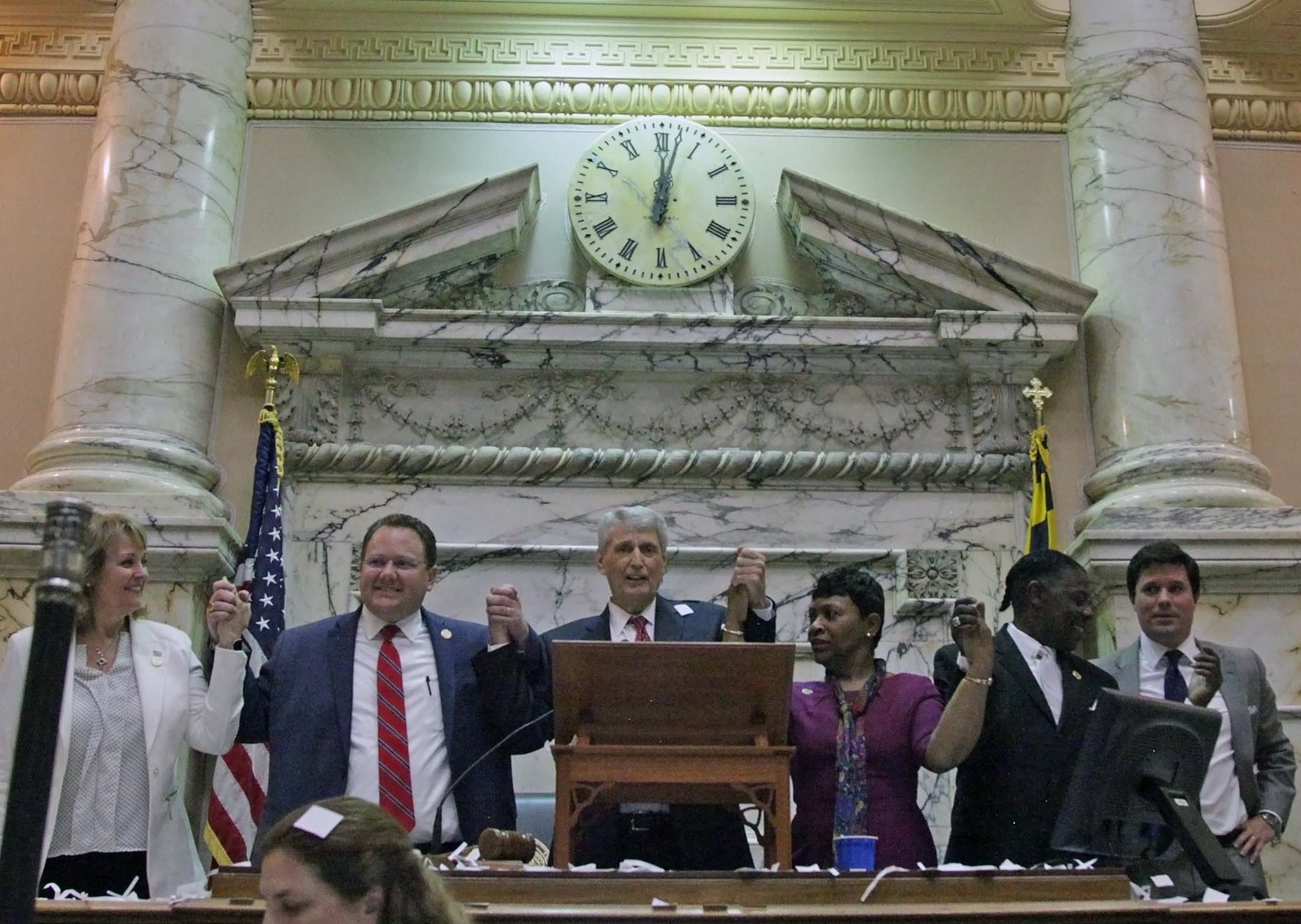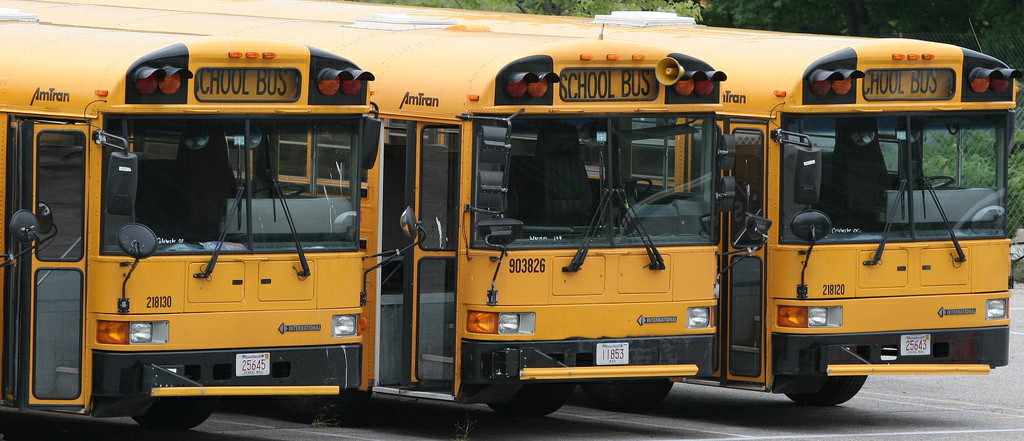By Capital News Service and MarylandReporter.com
“It was a great session,” Gov. Larry Hogan said about the just closed 90-day meeting of the Maryland General Assembly. “This is the way government is supposed to work…. This was all about compromise.”
“It was a session we can all be proud of,” House Speaker Michael Busch, sitting next to Hogan at a bill signing ceremony Tuesday morning. “This year your staff did a great job.”
House Minority Leader Nicholaus Kipke, R-Anne Arundel, told Capital News service that “despite the partisan efforts to kind of drag us into the D.C. post-election theater, we were able to pass some meaningful bills.”
Despite its many battles, Kipke said the 2017 session was the “most bipartisan” he has seen since he took office. Hogan concurred, telling reporters that 2017 was an “incredible, bipartisan session.”
It was so bipartisan that as Republican delegates talked the clock out on a bill expanding medical marijuana licenses, it was Kipke who made the motion to “adjourn sine die” at midnight, a role typically reserved for the House Democratic majority leader. This partially reflected bipartisan distaste for how the bill was written and forced on them by the Senate.
“We got everything done that needed to get done in terms of the legislation,” said Senate President Mike Miller. “We dealt with health care, we dealt with education, we dealt with environment and we dealt with public safety. So I think it was a very good year quite frankly.”
The two parties came together on several significant issues, most notably job creation, opioid abuse, anti-fraud measures, education, and environmental issues.
And in very Democratic Maryland, Republican Hogan continues to be the second most popular governor in Maryland, according to a Morning Consult poll released Tuesday based on an online survey over the last three months.
MANUFACTURING JOBS: The More Jobs for Marylanders Act (SB317) passed with strong bipartisan support. The law is designed to bolster manufacturing jobs in Maryland by offering tax incentives to companies that create jobs in high-unemployment areas and job training programs. Hogan considered the law a core piece of his 2017 agenda and signed it into law Tuesday.
Sen. Rich Madaleno, D-Montgomery County, often critical of Hogan, described a bipartisan process of senators who worked on the bill with administration representatives.
Mike Galiazzo, president of the Regional Manufacturing Institute, said the bill represented a good signal to manufacturers that Maryland was interested in promoting their businesses, which hadn’t gotten any tax breaks in 15 years.
The lone senator to vote against the bill, Sen. Roger Manno, D-Montgomery, had worked on his own version of tax incentives for manufacturers for three years.
Manno called the bill that was signed “a steak dinner for big business and a chicken box for the workers.”
OPIOID ABUSE: Maryland passed restrictions on the quantity of opioid painkillers that can be doled out by doctors in a single visit (HB1432); measures to increase the availability of naloxone — a drug that can counteract the effects of overdose (part of the HOPE act); and introduced steep penalties for people who distribute opioids that later cause the death of another person. The legislature passed a Hogan administration bill setting new penalties for distributing Fentanyl — an extremely potent synthetic opioid that has a high rate of lethal overdoses (SB539).
CRISIS TREATMENT: (UPDATED) The Heroin and Opioid Prevention Effort and Treatment Act of 2017 (or HOPE Act, HB1329), which passed late Monday with only one dissenting vote, is a broad response to the state’s opioid crisis. A key provision will increase reimbursement rates for community-based behavioral health providers over the next three years. Community behavioral health providers will receive reimbursement rate increases of 3.5% annually in the next two years and a 3% increase in the third year. This reimbursement increase was the key goal of the Keep the Door Open campaign.
PROTECTING TAXPAYERS: The Taxpayer Protection Act (SB304), a Hogan priority, makes it easier for the state to prosecute fraudulent filers for tax refunds and gives the comptroller’s office greater latitude to investigate tax fraud and identity theft. Comptroller Peter Franchot pushed hard for the legislation, holding conferences and events around the state to drum up support for the bill. It passed this year with unanimous support in the Senate and in the House of Delegates.
CLEAN CARS, WATER: Hogan administration environmental legislation included the Clean Cars Act (HB406), which increases the state’s budget for tax credits for electric vehicles, and the Clean Water Commerce Act, which expands the scope of the Chesapeake Bay Restoration fund to include sediment reduction, but does not include any new funding (SB314). Both had strong support from both Democrats and Republicans.
As always, a majority of proposed bills died, including some with significant support.
MEDICAL MARIJUANA: Tops among the failed bills was legislation that would expand the number of growing licenses for the state’s medical marijuana industry (HB1443) in an effort to increase diversity in business ownership. Sen. Joan Carter Conway, D-Baltimore, said she was “devastated” the House didn’t pass the bill before the midnight deadline. “We have a multi-billion industry with no minorities participating,” Conway said. “…I’m almost speechless.”

Delegates protest Senate rejection of sanctuary bill. MarylandReporter.com photo
SANCTUARY STATUS: Latino delegates were outraged after the Maryland Law Enforcement and Governmental Trust Act (SB835) died in the Senate. The bill would have essentially made Maryland a sanctuary state by restricting the involvement of law enforcement agencies in Maryland with federal immigration efforts, banning state government agents from asking crime victims or suspects about their immigration or citizenship status.
Members of the Latino caucus walked off the floor at 4 p.m. Monday to demonstrate their displeasure that the Senate Judicial Proceedings Committee and Miller were blocking the bill.
Del. Jocelyn Peña-Melnyk, D-Prince George’s, shouted that Miller and committee chair Bobby Zirkin, D-Baltimore County, were “Democrats in name only” (DINOs). “Shame on you” she said of Zirkin. “I hope your district takes you out.”
Hogan was opposed to the bill as well.
INTERNET PRIVACY: After Congress repealed a federal rule regulating use of consumer data by Internet service providers, Sen. Jim Rosapepe introduced a bill, SB1200, to have Maryland regulate data privacy last week. The measure passed the Senate, but died in the House Economic Matters Committee with no action.
Len Lazarick of MarylandReporter.com and Capital News Service reporters Jacob Taylor, Jake Brodsky, Natalie Schwartz, Carrie Snurr, Hannah Klarner, Cara Newcomer and Jack Chavez contributed to this story.







Recent Comments